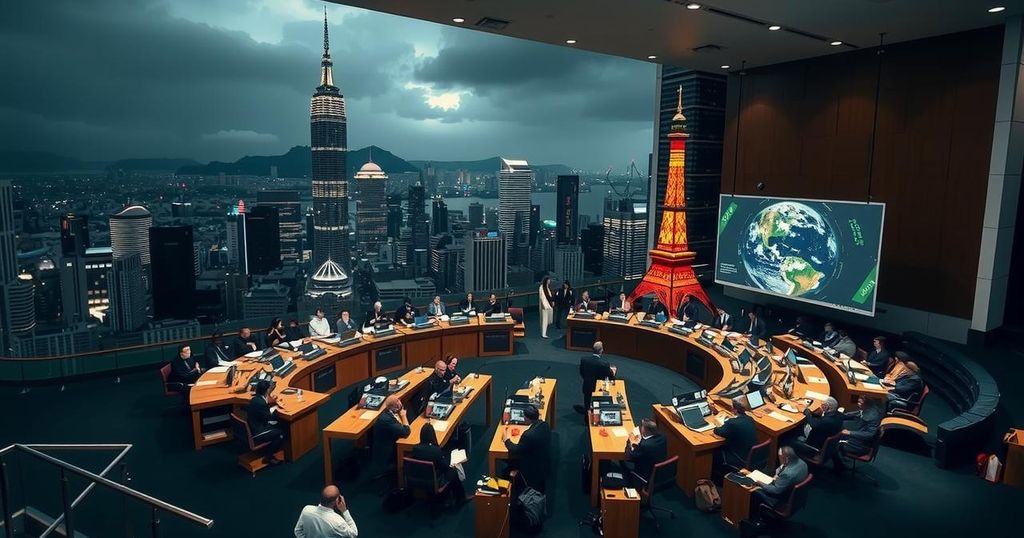Climate change
Global news
AFRICA, ANTONIO GUTERRES, ASIA, AZERBAIJAN, CHAN, CHANDNI RAINA, CLIMATE CHANGE, GEOPOLITICS, INDIA, INTERNATIONAL RELATIONS, JI, JIWOH ABDULAI, JUAN CARLOS MONTERREY - GOMEZ, NIGERIA, NKIRUKA MADUEKWE, PARIS AGREEMENT, REUTERS, SIERRA LEONE, STE, STEGE, TAIPEI TIMES, TINA STEGE, UN
Jamal Walker
0 Comments
Developing Nations Criticize Insufficient COP29 Climate Pledge
At COP29, developing nations criticized the US$300 billion annual climate pledge by wealthier countries, calling it insufficient compared to the aid needed to combat severe climate challenges. The agreement, forged amid difficult negotiations, was met with disappointment, with leaders expressing a need for a more ambitious financial commitment to genuinely address the escalating climate crisis.
The recently concluded COP29 climate summit in Azerbaijan resulted in a contentious climate agreement, where developing nations sharply criticized a proposed annual financial pledge of US$300 billion by 2035 from wealthy nations. These nations, significantly affected by climate-induced disasters, deemed the pledge insufficient and an affront to their plight. India’s delegate, Chandni Raina, referred to the agreement as “abysmally poor” and an “optical illusion” that fails to confront the severity of climate challenges. Sierra Leone’s Environment Minister Jiwoh Abdulai echoed these sentiments, emphasizing the insufficient support from developed countries at a critical time when poorer nations face rising sea levels and extreme weather conditions.
Although some developing nations expressed disappointment, such as Marshall Islands climate envoy Tina Stege, who claimed to return with only a “small portion” of requested funds, there were acknowledgments that this agreement might serve as a foundation for future discussions amid a grim climate outlook. UN Secretary-General Antonio Guterres remarked on the need for a more ambitious outcome, highlighting the ongoing risk of exceeding the critical 1.5°C global temperature rise threshold.
Cop29 delegates grappled with deep-rooted disparities regarding financial responsibilities between developed and emerging economies. UN Framework Convention on Climate Change Executive Secretary Simon Stiell acknowledged the flaws in the final agreement, reminding nations that no aspect was entirely satisfying, which necessitated prioritizing the continuity of international negotiations over perfection. In summary, while discussions at COP29 concluded without fully meeting the expectations of developing nations, it highlighted the urgent need for more substantial financial commitments and a cooperative approach to tackling climate change.
The COP (Conference of the Parties) annual summits serve as critical platforms for member countries to negotiate and address global climate change. COP29, held in Azerbaijan, has been marked by intense negotiations between developed and developing nations regarding climate finance and responsibilities. Historically, developed nations, as major historic polluters, have been called upon to provide financial support to poorer nations that are most vulnerable to the impacts of climate change. However, the $300 billion deal proposed at COP29 has drawn considerable backlash from developing countries who argue it falls drastically short in addressing the pervasive and escalating climate crisis they face.
In conclusion, the COP29 climate deal elicited strong reactions from developing nations, as they perceive insufficient financial commitments from wealthier countries. The proposed US$300 billion annual pledge by 2035 was characterized as inadequate by several delegates and environmental advocates. The necessity for a more substantial and actionable framework to support vulnerable nations in coping with climate change demands ongoing dialogue and stronger commitments in future negotiations. Without significant changes, the prospects for achieving meaningful climate action remain bleak.
Original Source: www.taipeitimes.com




Post Comment